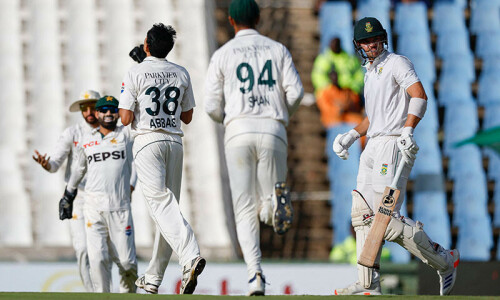TOKYO: Tokyo Olympic organisers and the International Olympic Committee said on Thursday they will cut some of the extras out of next year’s postponed games, an attempt to limit what is expected to be billions of dollars in added expenses.
IOC member John Coates, who heads the inspection team for Tokyo, said in a teleconference that cuts were likely in areas such as hospitality and expensive live sights for public viewing.
“Do we need to make provisions for as much hospitality for the sponsors, the broadcasters and the national Olympic committees?” Coates asked, suggesting the coronavirus pandemic may dampen enthusiasm. “Many of the broadcasters may not have as big a presence here of advertisers because of the economic downturn.”
Coates talked about the difference between must-have features and nice-to-have accessories, which may be ruled out when the Olympics open on July 23, 2021.
Coates also made it clear that Tokyo organisers and the Japanese government will be absorbing the billions in added expenses.
“We will be exploring all opportunities to optimise and streamline the scope and service levels at the Games, and reduce the costs that have been caused by the postponement,” Coates said.
“All of the athletes services will remain the same but there must be other areas of hosting a Games that we can look at and decide what are the must-haves and what are the nice-to-haves.”
He said the IOC would make several hundred million dollars in an emergency contribution to help struggling international sports federations and national Olympic committees stay afloat. The money is not destined for the Tokyo organisers and the Japanese governments, which are preparing the games.
IOC President Thomas Bach mentioned the contribution in a Sunday interview with a German newspaper but was not specific about the recipients of the aid.
“We will not stand by and see our international federations collapse,” Coates said.
Japan’s obligation to absorb the added costs is stipulated in the Host City Contract signed in 2013 when the IOC awarded Tokyo the Games. Neither the IOC nor Japanese officials are offering cost estimates, but media reports in Japan suggest an added bill of $2 billion to $6 billion on top of current spending.
Japan says officially it is spending $12.6 billion, but a national audit says the figure is twice that much. Whatever the total, all but $5.6 billion is public money.
The IOC was expected to pay out about $600 million to federations this year, proceeds from the Tokyo Olympics. Some federations rely almost exclusively on IOC contributions.
A reporter for Japanese broadcaster NHK asked organising committee president Yoshiro Mori if the IOC should pitch in on costs to help Tokyo.
“We are in the midst of studying and reviewing the additional costs,” Mori said. “Of course, we know that we will have to pay what we have to pay. However, the general direction is reducing the costs to the extent possible.”
Tokyo CEO Toshiro Muto promised to take a fresh look at the level of services we provide.
“Of course we will respond to the requests from federations and the national Olympic committees,” Muto added. “If we fully responded to all the requests coming from those entities the costs would be exorbitant.”
Coates was asked to explain how Japan will be in shape to host the Olympics in 15 months. Muto also expressed his concern last week.
The Australian struck a more optimistic tone when speaking about the potential positive impact the Games might have on a Japanese economy.
“Next year, in 2021, if Japan is anywhere like the rest of the world, there is an economic downturn, a recession maybe, these Games are a very positive opportunity for an economic stimulus,” said Coates.
“These Games can be how you kickstart the economy again. These Games could be the re-birth of the tourism industry, these Games could provide opportunities for hotel operators, for your airlines.”
Tokyo’s coronavirus cases have been spiking and Prime Minister Shinzo Abe has called for emergency measures, asking people to stay home.
The games host 11,000 Olympic and 4,400 Paralympic athletes and staff from 206 national Olympic committees.
They also rely on extensive global travel, and will need a go-ahead for mass gatherings 75,000 in Tokyo’s new national stadium or 10,000 to 15,000 in many arenas.
“We’ve given ourselves as much time as possible,” Coates said, pointing out that some wanted to reschedule for the spring of 2021. “That was a factor to go as late as possible.”
Published in Dawn, April 17th, 2020















































